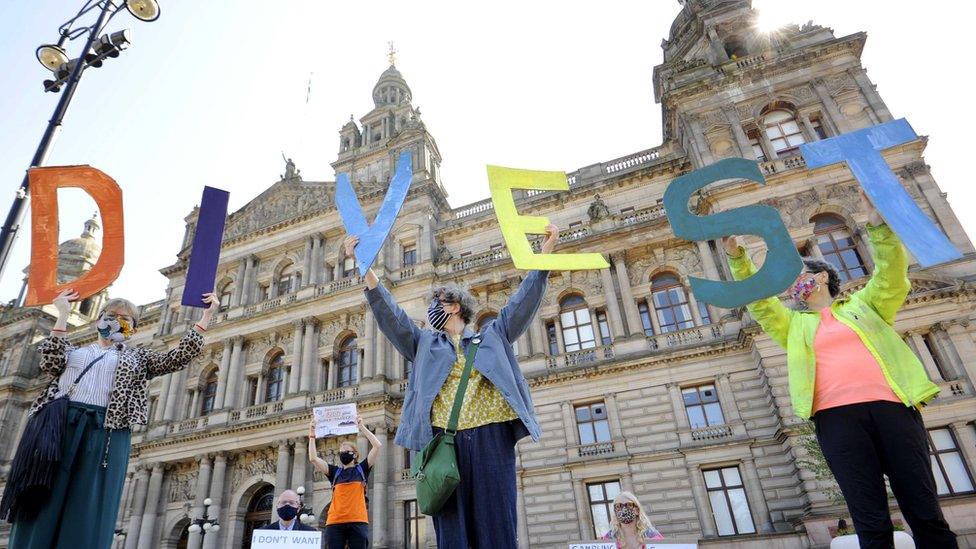Scotland's largest council pension fund backs climate change move
- Published

Campaigners have been calling on Glasgow City Council to divest fossil fuel funds
Scotland's largest council pension fund is to end investments in fossil fuel companies that are not strongly committed to reducing emissions.
Environmental groups have been calling for years for local authorities to divert investments away from coal, oil and gas.
The £24bn Strathclyde Pension Fund covers 12 councils including Glasgow.
It will now carry out an assessment of energy sector companies in its portfolios and set minimum standards.
Environmental campaigners said that while the agreement meant divestment could take place in principle, councillors had effectively deferred the decision by not setting a clear timeline.
They called for strong climate standards and a timeline to be agreed in the coming months to ensure that divestment actually happened.
The pension fund move came in response to a call from Glasgow City Council which passed a motion in April.
Glasgow - which manages the fund - asked the pension fund committee to formally commit to ending fossil fuel investment before the city hosts the major climate change conference, COP26, in November.
It added that divestment should be completed no later than 2029.
Energy sector firms in the fund's portfolio will be assessed and if they do not meet minimum standards then the fund will divest.
Divestment will be completed "as quickly as possible whilst ensuring no detriment to the financial stability of the fund".
Standards will be set by investment managers and Sustainalytics, a company that rates the sustainability of firms based on environmental and social performance.

Divestment is not as simple as it used to be. Not that it was ever that simple.
Five years ago it was fairly clear cut that companies like BP, which drilled for oil, were the baddies while those like Vattenfall building wind farms were the goodies.
Now everyone's into everything. BP runs one of the larger electric vehicle charging networks in England and Shell have been investing in offshore wind in the North Sea.
SSE, which has long been into renewables, now runs Scotland's most polluting industrial site at Peterhead Power Station.
And a lot of the engineering in the oil and gas supply chain will now be used to develop carbon capture and storage technology.
So the fund managers who look after the massive Strathclyde Pension Fund have a challenging task ahead in deciding what's green and what's not.

'Not a panacea'
Glasgow City Council is responsible for the local government pension scheme on its own behalf, for 11 other west of Scotland councils and more than 200 employers. It has more than 250,000 members.
The other councils covered by the scheme include all the councils in Lanarkshire, Dunbartonshire, Renfrewshire and Ayrshire as well as Argyll and Bute and Inverclyde.
Strathclyde Pension Fund director Richard McIndoe said: "If any of those companies don't meet the minimum standards that we set, then we can disinvest from them."
The fund would be able to disinvest from "bad oil companies", he said, but added "disinvestment is not a panacea".
A Friends of the Earth Scotland study estimated the pension fund holds £508m of investments in what it calls "highly polluting fossil fuel companies", including Shell, BP, Chevron and Exxon.
FoE Scotland's divestment campaigner Sally Clark said: "The decision by councillors today is a positive step, but there is much more to do in order to set Scotland's largest public pension fund on a fossil free path."
She said: "Similar funds such as the Cardiff, Lambeth and Waltham Forest pension funds have already committed to go fossil fuel free and the Strathclyde Pension Fund can join them."
- Published3 June 2019

- Published23 February 2021
